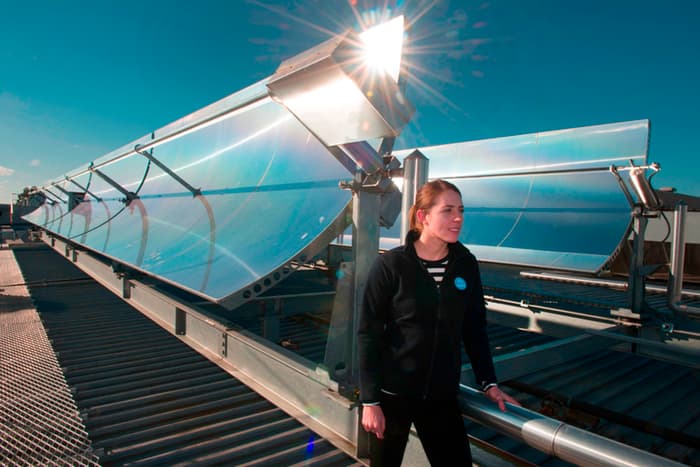Solar-concentrating thermal technology is being used to power the air-conditioning system of an entire shopping center in Australia solely from the rays of the sun. With around 60 percent of all energy used in shopping centers being consumed by heating and cooling needs, the new system could lead the way to significant power and cost savings in a range of large commercial spaces.
Installed in the Stockland Wendouree Shopping Centre in Ballarat,
Victoria, the prototype system was developed by the CSIRO and partly
funded by the Australian Renewable Energy Agency (ARENA) program,
which aims to increase the supply and competitiveness of renewable
energy in Australia. The same program helped support the CSIRO's
world-record breaking
solar-powered supercritical steam generator.
The new solar-powered system is a "closed-loop" air-conditioner, meaning it heats and cools air within the building without introducing any external air into the system, with a pair of "desiccant" (drying) wheels acting as dehumidifiers to remove moisture from the air. These operate at separate temperatures; the high-temperature wheel uses the captured solar energy for regeneration of the low temperature wheel, which operates without any external heat at all.
"CSIRO's energy research is driving down costs of renewable technologies, accelerating the transition to a lower-emissions future," said CSIRO Energy Director Peter Mayfield. "We are pioneering new technologies and this project is a world-first demonstration of a desiccant air-conditioning system using roof mounted concentrating solar thermal collectors."
The air conditioning system uses trough collectors to capture solar heat of around 150 to 200° C (302 to 392° F) and then store it in a 2,000-liter (528-US gal) thermal oil tank. Utilizing a heat cascading design, heat from the tank is used to heat the center's ambient air in the winter and power an indirect evaporative cooler to cool the center in summer. So compact is the system, that the whole solar air-conditioning unit is some 40 percent smaller than a comparable standard single-stage desiccant system.
The researchers believe that solar heat-driven desiccant air conditioning systems have the potential to significantly reduce the electric power requirements and costs related to supplying humidity controlled fresh air in large commercial spaces.
The team at the CSIRO intend to spend the next 12 months monitoring and assessing the new system and gauge its capabilities in a commercial environment. These observations will add to the long-term goal of the CSIRO to help contribute to a low- emissions future. ARENA contributed AUD$520,000 (US$386,000) to the project, with the remainder of the AUD$1.2 million (US$890,000) being provided jointly by the CSIRO and the Stockland Group using technology from NEP Solar.
Source: CSIRO

